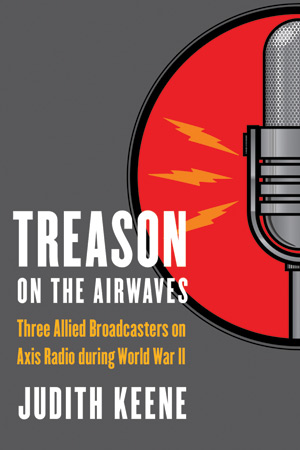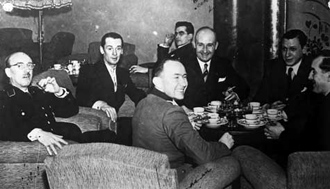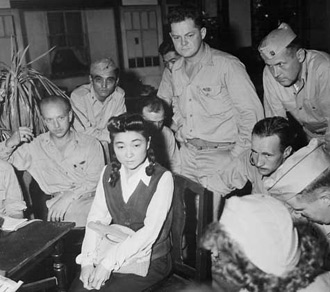Traitors in wartime have a long history. During World War Two, both Allied and Axis governments used enemy nationals to broadcast propaganda. When the war ended, the victors prosecuted a number of their own citizens for treason.My book tracks the vivid experiences of three individuals who broadcast on Axis radio and later were tried as traitors. Although the treason laws in Britain, Australia and the United States were much the same, and the behavior of the three appeared similar, the outcome of their trials was determined by a conjunction of popular emotion and post war politics.John Amery was executed in London in December 1945. His father, Leo, a long-standing member of the British Parliament, was a figure of great gravitas in Conservative and imperial circles. It was he who made the rousing speech that brought down Chamberlain’s administration in May 1940 and ushered in Churchill’s wartime government, in which Amery served.
There is no doubt that between 1940 and 1945 John Amery hitched his star to a Nazi victory. In France when war broke out, he joined a motley cavalcade of anti-Semitic, pro-German propagandists spruiking the power and the glory of the “New Europe” under Nazism.Not surprisingly, these broadcasts, especially those beamed to Britain, caused his parents great pain. On air, John invariably railed against the “Jew-lover” Churchill and derided King George VI as “that stammering idiot” and the “living proof” of English degeneration.At the end of the war, British Intelligence brought Amery back to London where he pleaded guilty to High Treason. This “honorable act” as his father called it—perhaps his only one—saved the family the ordeal of a long trial. Equally, it avoided the public catalogue of the son’s disreputable doings that would have reflected badly on his younger brother, Julian, who ran on a Conservative ticket, with Churchill’s son, in the khaki elections immediately after the war.
Charles Cousens, taken into Japanese captivity at the fall of Singapore, was a well-known broadcaster on Australian commercial radio.The Japanese military until very late in the war was convinced that “winning the thought wars,” as they termed the new medium of radio propaganda, was an essential element in military strategy. Consequently, Japanese officers trawled the POW camps and holding pens across the Pacific, ferreting out anyone with radio experience.
From mid 1942, and with a band of Australian and American POWs, Cousens created a lively music program that was beamed from Tokyo to Allied fighting men across the Pacific; and to their families in the United States and Australia. Probably the only truly popular propaganda program on Axis radio anywhere, Zero Hour specialized in new American music, pop, the big bands and jazz. Intermittently, as well, broadcasters read lists of POW names and occasional messages, some genuine, most invented, to families at home.As a captive of the Japanese, Cousens clearly had no real choice about whether to broadcast or not. Equally though, he was a gifted radioman and enamored with the new mass medium. At the end of the war, one of the very few Allied broadcasters in Tokyo to be charged with treason, he faced trial in Sydney in a blaze of publicity at a time when Australians were inflamed by anti-Japanese hatred.
Although he was found to have a case to answer, in September 1946, the complicated legal relations that then existed between Australian states and the federal government resulted in Cousens being no-billed. That is the government prosecution declined to proceed with a treason trial in the higher court.Iva Toguri, better known by the sobriquet “Tokyo Rose,” was chosen by Cousens from the Radio Tokyo typing pool to be the female disc jockey on Zero Hour. She had grown up in Southern California; her father owned a grocery store in East LA. Having just graduated from UCLA, she was sent to Japan to learn the language and meet the relatives. At the time of Pearl Harbor, Iva was one of more than fifty thousand young foreign-born Japanese, mostly North Americans, who were stranded in Japan.According to all who knew her, Iva was the all-American girl. Hair cold waved, she wore a plaid skirt and saddle shoes and her speech was peppered with American slang. Throughout college she and her sisters enjoyed nothing better than to roll up the living room carpet and jitterbug.Throughout the years in wartime Japan, Toguri never relinquished her American citizenship, though she was placed under considerable pressure to do so. Cousens, who gave evidence for the defense in her later treason trial in San Francisco, testified that she had given constant aid to the Allied POWs, including himself, whom she worked with at Radio Tokyo. Iva claimed that she had never stopped praying for an American victory so that she could return to her family in the United States.
The Toguris themselves spent the war years interned in Nevada.Iva was convicted on a single charge of having broadcast in favor of the enemy. It was very curious because the incident cited in court took place during the Battle of Leyte, in which America was victorious. It made no difference to the verdict that there were more than thirty other North American-born women also broadcasting over Tokyo shortwave. Probably half that number again was involved with programs relayed from other Japanese stations across the Pacific. None of these broadcasters was charged. Indeed, at the end of the war most of the American-born Japanese working at Radio Tokyo simply applied to the American embassy for new papers and returned the United States to resume their pre-war lives.After serving seven years in a ten year sentence, Iva was paroled but remained in a terrible legal limbo. She was officially stateless, having been stripped of her citizenship as a convicted traitor, but remained an American by birth. In a different political era, Gerald Ford pardoned Iva Toguri in his last day in office in January 1977.





